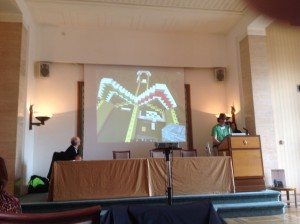On the 4th March I went to Senate House to play games, sorry, that should read learn about games, gamification and games based learning via a symposium run by In Focus, chaired by Steven Warburton (University of Surrey) and Alex Moseley (University of Leicester).
At registration we received a ‘game card’ along with our badges and timetable. Mine was a red quest card. On the back of the card were the mission instructions starting ‘On the front of this card is you identity. Inhabit it. Become it…’ I knew I was in trouble straight away searching for Welsh dragons – surely, they are a protected species. The mission we had to accept was to make a group of 3-5 people. Each group had to contain at least one holder of a green (learning need), purple (technology) red (games mechanic) and blue (narrative theme). Each group had to create a game using the identities on the cards, write it up in 150 words and submit it online by the end of the lunch break. My initial quest for a group in need of a red card carrying member proved fruitless. In desperation a group I approached yelled ‘No, we need a purple card carrier’. Ah ha. I could see no rules, terms or conditions which forbade swapping/exchanging cards so I cashed in my red quest for a purple mobile app and joined the group of three from King’s College.
Nicola Whitton (Manchester Metropolitan University) keynote speaker made reference to the difficulties of using games as a learning device within education, as education is not tolerant of failure in contrast to the magic circle of game playing which actively encourages us to learn from our mistakes – the more we play the better we get at the game.
The sessions were a nice mix of practical demonstrations of projects which use games and make learning fun, at every level of study and theory behind game playing and players.
A few highlights (for me) were :
HullCraft which is a project which brings works stored in the archives to life using MineCraft modelling. Joel Mills (https://twitter.com/ilearninguk) has added digital badges and leader-boards to the basic build. Further enhancements enabled assessment marking to be carried out in HullCraft and exported into the VLE. This project has proven so popular at Hull that it has been expanded into other subject areas, such as Sports Science, the next stage will be to incorporate a narrative adventure element to HullCraft.
I was fascinated by Andrzej Marczewski’s insight into building games for multiple types of user. It appears that most computer games are designed to please the ‘players’ but this constitutes only 7% of the user types. In fact, most user types are ‘achievers’ and even the ‘disruptors’ make up 8% of the user types!
Ok, I admit it, the real highlight of the event was the last speaker – Adrian Hon, yes, the guy who created Zombies Run and The Walk. He said that when creating the first Zombies Run he had not been trying to gamify running but adding an element of make believe. He expressed the opinion of many of the speakers at the event that gamification has gained a (bad) reputation for trying to make something that is intrinsically boring fun and agreed with Nicola Whitton that we should not be tolerating the boring.
My team entry of a mobile app for a citing and referencing mine game won the runners up prize. My new quest is to find and tell my team-mates from King’s who left before the announcement was made.

